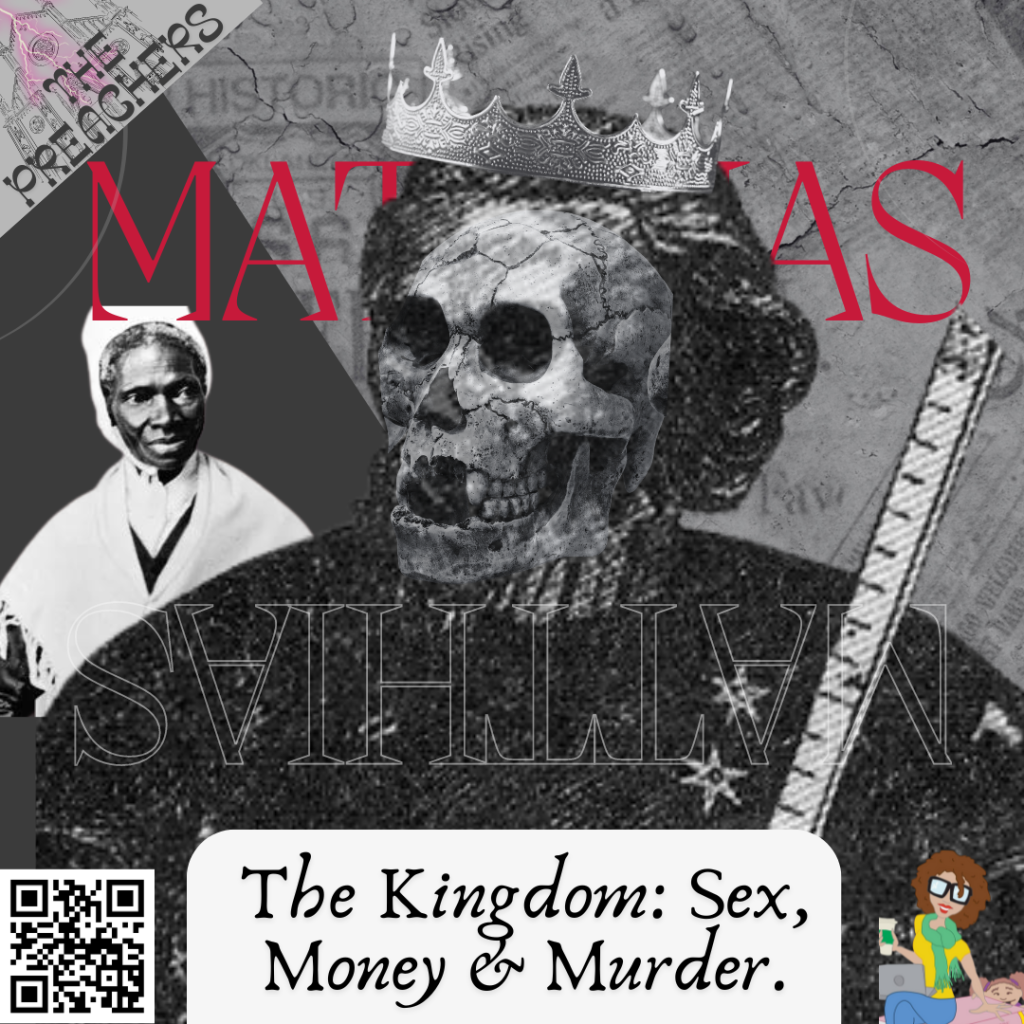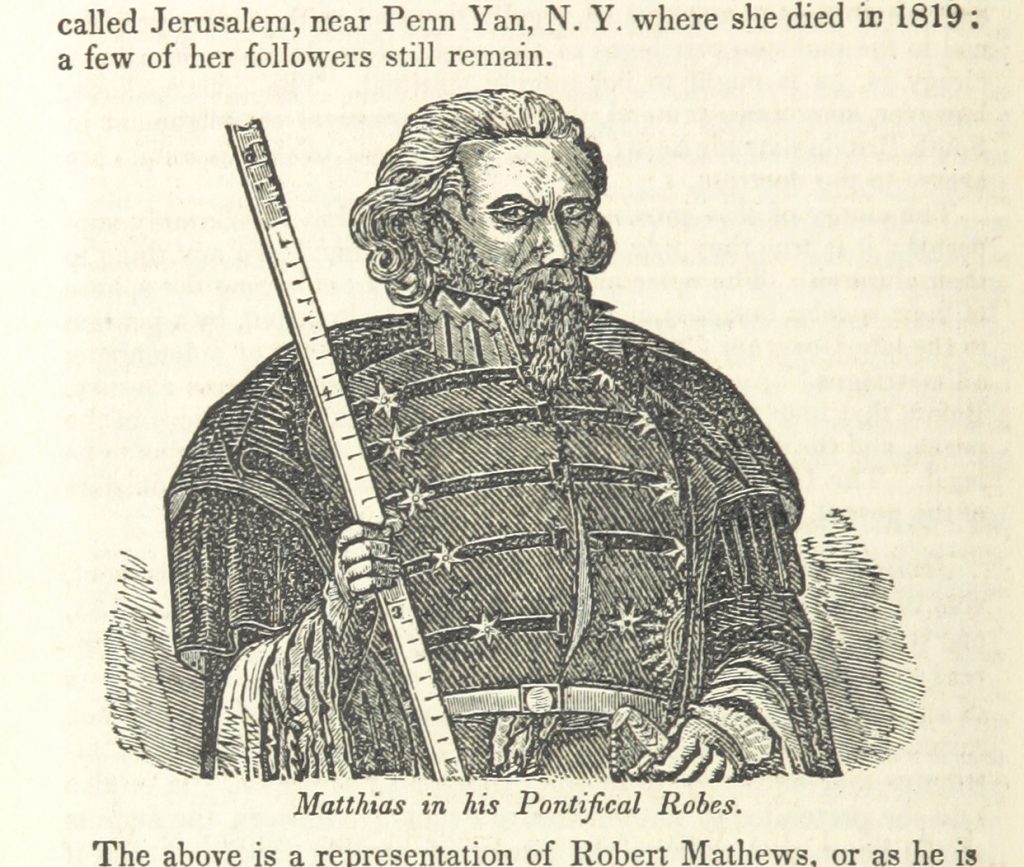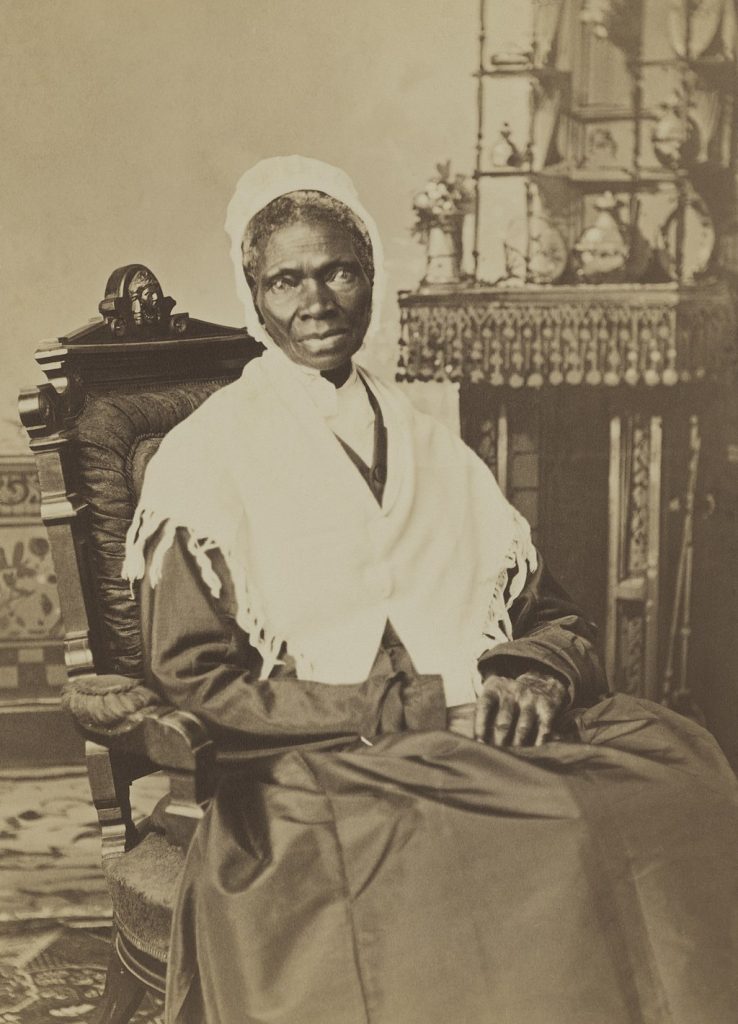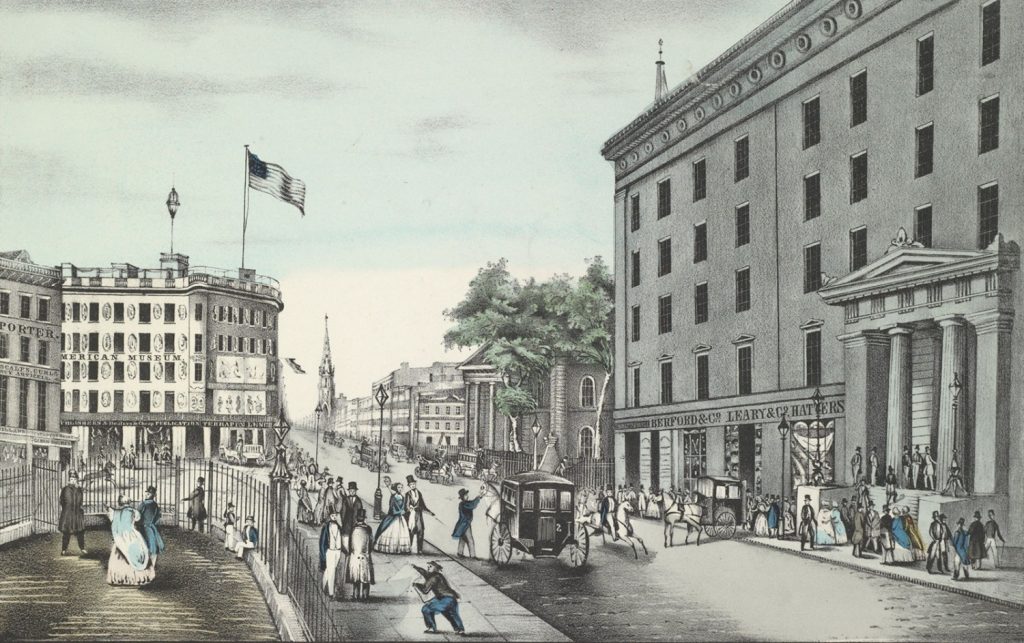The Preachers: The Prophet Matthias.

Adultery. Financial scamming. Lies. Death. I’ve written about all these things in the past in The Preachers series, but I never got them all in one story… that occurred in the early 19th century. Even stranger, this cult involved Sojourner Truth- yes, that Sojourner Truth. So sit back, relax, and allow me to introduce you to Robert Matthews, better known as The Prophet Matthias. I used The Kingdom of Matthias: A Story of Sex and Salvation in 19th-Century America as my primary source (and all quotes come from the book).
The religiously strict upbringing shapes the boy.
Robert Matthews was born in 1788 to a Scots immigrant family in the farming village of Cambridge, in Washington County, New York.
Clustered in their farms and shops about a mile from the village proper, the Cambridge Scots mostly kept to themselves and to their old ways in their new home. Above all, they clung to their uncompromising Scots Calvinism, nursing ancient ecclesiastical grudges unknown to the rest of the world.
It would have been hard to find, anywhere, more dedicated adherents to Calvinist orthodoxy. Cambridge’s Anti-Burghers read their Bibles literally and debated their scriptural understandings. They rejected Romish, priestly ritual (although, like other Scots Presbyterians, they retained a heavily modified version of the Eucharist). They sang psalms without any instrumental accompaniment and without the aid of hymnals, in imitation of the primitive Christians; they guarded against any perceived government interference in their religious affairs; they demanded strict observance of the Sabbath and enforced a personal code of righteous temperance every day of the week.

He married, had children, and at first followed a relatively conventional path. But by the 1820s, the contradictions within him—the tension between Calvinist certainty and personal ambition—began to rupture. Business ventures failed. His marriage collapsed. He was humiliated. He became convinced that religious institutions were corrupt and that only he could restore true divine order.
And that’s when he heard a voice. God’s voice. Or so he claimed.
Matthews declared himself The Prophet Matthias, the spiritual heir to the biblical Matthias who replaced Judas. Like many self-declared prophets of doom, he insisted that the true faith had been corrupted by modernity, female influence, institutional churches, and weak-willed men.
The Kingdom Comes
Once Robert Matthews took on the name Prophet Matthias, his rhetoric hardened. He claimed the Spirit of Truth had descended upon him, marking him as God’s final authority on Earth. Unlike the soft, compromised preachers of the churches he had abandoned, Matthias would restore the Patriarchal Order. In this new spiritual hierarchy, the man was king, the woman was subject, and “Truth” came from the mouth of the Prophet alone.

Here we get to the heart of his theology, if you can call it that: Matthias wasn’t preaching salvation as a gift. He was preaching order. He wasn’t about freeing people from sin; he was about binding them to him.
He claimed that God had withdrawn favor from America because it had become too feminized, too corrupted by false religion and “moral reformers”—especially those meddling women (nothing new under the sun, Folks). He denounced the growing Evangelical movement, the rise of temperance societies, and any form of spiritual leadership by women as an offense against divine design.
In Matthias’s theology, men ruled, women served, and prophets stood above all. It was Calvinism on steroids, stripped of nuance and weaponized for personal dominance.
Then came Elijah Pierson.

Enter the Apostle
Elijah Pierson was the perfect mark: a wealthy, pious widower with a penchant for religious excess. Grieving the death of his wife (whom he had literally tried to resurrect with prayer and a bowl of cold water), Pierson was spiritually unmoored and emotionally broken.
Matthias swooped in with the claim that Elijah was none other than the Apostle Elijah, chosen to help him usher in the Kingdom of God.
With Pierson’s wealth and devotion at his disposal, Matthias gathered followers and established the Kingdom at a mansion in Sing Sing, New York. He declared himself head of the household, which was rebranded as the “House of Israel.” It included men, women, and children—some true believers, some too afraid or too entangled to leave.
Matthias wrapped himself in finery as befitting one so anointed:
[His] hallmark, as ever, was a perfectly tailored green frock coat with a straight, military collar. He now had several of these coats: some with brass buttons, some with gold braid, some with elaborate frog fastenings, and at least one with a silver sun embroidered on the left breast, a shower of silver stars on the right, and a lining of pink silk. (The green fabric, by one estimate, cost a stupendous $14 per yard.)
That’s nearly $500 per yard in today’s money. More:
When queried, Matthias explained his clothes and tools: The white linen nightcaps were “pale mitres”; the green three-cornered hat with gold trim was the rainbow surrounding the head of Him that sits upon the throne; the silk coat linings of pink or white signified Joseph’s coat; he wore a crimson sash because Matthias was the one in Isaiah who treads the wine press alone; and the rich green of his coat told the world that the Dove (the Holy Spirit) had at last found a resting place. It was a confused and outlandish pile-up of Biblical references, but to Mount Zion’s believers, it made perfect sense.
The rules were strict, arbitrary, and entirely subject to the Prophet’s whims. Matthias alone interpreted Scripture. He controlled the food, finances, and movements of his flock. He decided who was righteous and who was under demonic influence. And disturbingly, Matthias took absolute authority over the women—spiritually, domestically, and sexually.
His most scandalous relationship was with Ann Folger, who had joined the Kingdom with her husband, Benjamin, and their family. She ultimately abandoned Benny for the Prophet and became known as “Mother.” *Shudder* But that’s okay, since Benny Boy met Matthias’ young adult daughter, they smashed, and after a whipping from dear old Dad, they were married… by dear old Dad. *Double shudder*
The Prophet’s ministry was cloaked in the language of divine right. He was the Father. The ruler. The mouthpiece of God. And if you questioned him, you weren’t just disobeying a man—you were rebelling against the Lord. In one violent run-in with police, Matthias proclaimed himself “God Almighty and that the gentiles,” the cops and anyone not under his headship, “must leave God’s house.”
What started as a strange little sect was quickly turning into a cult.

Scandal, Death, and Strange Fruit?
The Kingdom of Matthias wasn’t just weird. It was dangerous.
Inside the walls of the Sing Sing estate, the Prophet began to show signs of volatility. He grew increasingly paranoid, violent, and erratic. He would scream at followers, berate women, and accuse dissenters of being possessed. He claimed the Devil had infiltrated the household—and only he could cast him out.
And then… someone died.
Elijah Pierson, the Apostle Elijah—Matthias’s financier, closest follower, and spiritual lieutenant—was found dead in the mansion dining room in the summer of 1834. The cause? A suspicious bowl of blackberries. Had he been poisoned?
At the end of the meal the Prophet spooned out plates of blackberries that he and Pierson had picked that day. Ann Folger ate only two berries. Catherine finished her plate, and Elijah wolfed his down and had another. Matthias had none at all.
…
About four o’clock the next afternoon, Elijah was salting hay and munching berries from the bushes, when he suddenly collapsed. … By the time the others got him back into the house, his beard was smeared with blackberry vomit and the smell of him was nauseating.
…
Matthias forbade any doctors or medicine to aid Elijah, and Elijah agreed: prayer and prayer alone could relieve his affliction.
After Elijah’s death, the Prophet proclaimed that he “lacked faith… for that reason his body had perished.” Matthias insisted Pierson had simply fulfilled his mission on earth and gone to be with the Lord. But others in the household weren’t so sure. His sudden death raised serious questions—and soon after, Robert Matthews was arrested, charged with murder and other offenses, including assault and fraud.
Here’s where things get even more tangled: Sojourner Truth, known then as Isabella Van Wagenen, was part of that household, working as the housekeeper.

Sojourner Truth and the Kingdom
Yes—that Sojourner Truth. Preacher, abolitionist, feminist icon.
Before she became the towering historical figure we know, Isabella was a seeker. Born into slavery in Ulster County, New York, she had been emancipated and was already developing her own spiritual voice.
As a little girl she had learned from her mother that there was a God in the sky, and young Isabella prayed in a voice loud enough to reach beyond the clouds… She grew certain that one day she would meet Jesus.
Like many newly freed Black Americans of the time, she was navigating a religious landscape full of revival, prophecy, and charisma. And she, too, was drawn in—briefly—by Matthias’s energy and conviction. “Isabella performed heavy household work and did most of the cooking.” She was once beaten severely by the Prophet for getting sick.
But her time in the Kingdom was short-lived. She saw through the façade.
After Pierson’s death, Truth was not only questioned by authorities—she was accused of theft, a scapegoating of a Black woman in a White man’s scandal. The charge was entirely unfounded, and she took the extraordinary step—for a poor, Black woman in 1830s America—of filing a defamation suit.
It was one of the earliest such legal victories on record for a Black woman in U.S. history.

The Trial and the Aftermath
Matthews was tried for murder, but the case was murky. Witnesses gave conflicting testimony, and the medical evidence was inconclusive. He was acquitted of murder, but convicted on charges of assaulting his daughter and defrauding his followers.
He served a brief prison sentence, was released, and… just kept going. He drifted from town to town, still claiming to be God’s anointed, still raving about demons, hierarchy, and holy order. But the Kingdom was gone. The mansion abandoned. His credibility shredded.
He died in obscurity, still clinging to his role as Prophet, long after the world had stopped listening.
There’s something uniquely American about his tale. Matthias took the Calvinism of his childhood, twisted it up, added a heavy dose of ego and control, and emerged as a prophet in a young, restless nation hungry for direction. The Kingdom he built was a cult, yes—but it was also a reflection of the structures that already existed around him: hierarchy, toxic religiosity, and White supremacy.
Yet Sojourner Truth saw the truth of it and walked away. She was dragged into his mess and still found a way to stand up for herself in court. She is a sharp contrast to the chaos of the Kingdom. Matthias was the false prophet; Sojourner was the quiet witness. Her legacy has been one of perseverance, strength, and history-making Truth.
In a world of “prophets”, be a Sojourner.

2 Comments
Join the discussion and tell us your opinion.
Wow. This shows me that YAH looks at the heart and your heart can be pulled toward YAH by humility and the sincere desire to known Him and be used by Him or the enemy by the offenses you take and the bitterness you refuse to release. Out of the ashes of one white man’s failure, a black woman rises to set the example and leave a legacy that he could have only dreamed of. God truly does use the rejected, overlooked and underdog to achieve the greats of feats. Great post!
Beautiful comment. Sojourner was greatly used by God and is a hero of mine for sure.